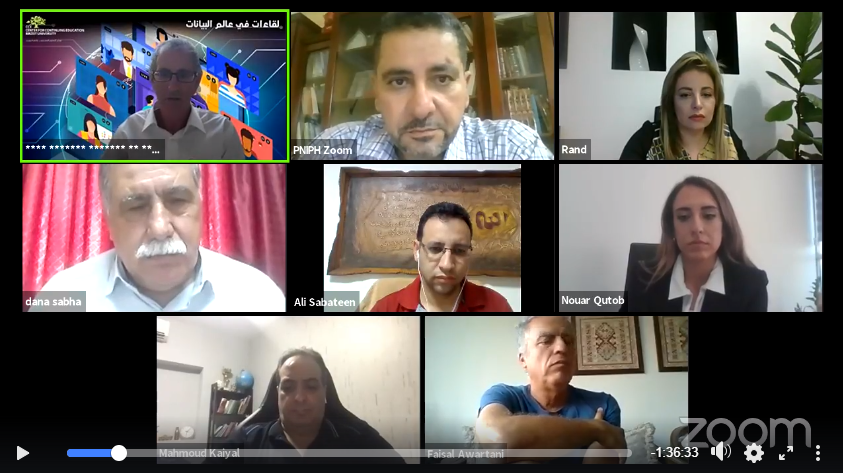Empowering Research, Service Delivery and Social Good through Open Access to Health Data in Palestine
Data is the fuel of the 4th industrial revolution. A few years ago it was described as the new oil of the 21st century - following advances in data analytics tools, reduced cost of infrastructure, huge amounts of data collected or generated from electronic devices and a global trend in open government with data at its heart.
The role of data is becoming more emphasized following the outbreak of the Covid19 pandemic and the accompanying infodemic. The new reality where several activities like education, work and logistics moved online over-emphasized the importance of data and digital transformation as pillars of resilience in all walks of life.
After absorbing the initial shock, the Ministry of Health (MoH), together with partners like the National Institute of Public Health and other donors and supporters, established the Covid19 Surveillance System (http://site.moh.ps/index/covid19/LanguageVersion/0/Language/ar) to provide statistics on the Covid19 status in Palestine. Several logistical and geo-political issues add complexity to the process and affect data quality and completeness. The Ministry has other registries of health data including time series of births, deaths, road accidents and mammography images among others - as evidence from MoH’s publications and reports on the Ministry’s website (http://site.moh.ps/index/Books/BookType/2/Language/ar).

The Center for Continued Education at Birzeit University organized two webinars inviting data, health and media professionals to exploring the role and potential of health data with special focus on Covid 19 (https://www.birzeit.edu/ar/news/mrkz-ltlym-lmstmr-ynqsh-fy-ndw-lktrwny-lbynt-lshy-wthrh-l-mnhy-lhy). During both meetings, the participants highlighted the need to provide access to disaggregated health data (not including private or protected data or internal administration and management data) to various stakeholders and to collaborate with professionals on improving the quality of the data (accuracy/precision, completeness, comprehensiveness, integrity, validity, relevance, and up-to-dateness/timeliness). Due to gaps in the legal framework, an open data government initiative was launched in 2018 and that was suggested as an alternative framework to initiate the release of government data on a voluntary basis. The special ministerial committee approved an open government data policy and set up an open data portal (http://www.opendata.ps/about).
The objectives of such an initiative include improving service delivery, resource planning and management, informed and accurate decision making and metrics (ex. SDG goals and indicators), helping researchers and data analysts, empowering the media to raise awareness and fight mis/disinformation, empowering data startups and entrepreneurs, and strengthening trust between the government and the general public (including advocacy groups).
Apart from clinical, behavioural or similar research where subjects (people) or samples or known profiles are involved and a close coordination with the Ministry and any other applicable entity is required and can be decided on a case by case basis, many data needs and requests can be satisfied with minimum effort by releasing general purpose disaggregated datasets for various topics/areas including Covid19 tests/cases and vaccines.
Several countries, including ones in the developing and third world, have adopted this data sharing methodology that led to economic and social benefits. Mexico is a good example of sharing Covid19 data offering downloadable files covering cases, data dictionary and morbidity database for 3 years (https://www.gob.mx/salud/documentos/datos-abiertos-152127). Examples from our region include Tunisia (http://www.onmne.tn/covid-19-situation-en-tunisie/), Morocco (http://www.covidmaroc.ma/Pages/AccueilAR.aspx, https://covidata.2m.ma/#/ar/, https://marocovid.com/) with community work based on government data, Qatar (https://www.data.gov.qa/pages/dashboard-covid-19-cases-in-qatar/) and Saudi Arabia (https://covid19.moh.gov.sa/). Other best practices are highlighted in the recent UN publication on digital government initiatives in response to Covid19 (https://publicadministration.un.org/egovkb/Portals/egovkb/Documents/un/2020-Survey/UNDESA%20Compendium%20of%20Digital%20Government%20Initiatives%20in%20Response%20to%20the%20COVID-19%20Pandemic.pdf).
Efforts continue to release health (including public, physical, mental and occupational health) data under the Palestinian Open Data Policy for the benefits and audiences outlined above. Covid19 data and related data take priority in light of the current context but other datasets are equally important. Working with experts and data professionals on improving data quality is a national priority which complements data openness, enhances performance, combats misinformation and narrows gaps in community knowledge and trust. It is understood that such gaps may not disappear completely, but should be narrowed down to a great extent. This should also help close data leaks where unauthorized access or data sharing usually includes private data. To streamline the process, the Ministry of Health was added to the open data committee and a few health data sets are likely to appear at the open data portal (http://www.opendata.ps/organization/moh) very soon.

